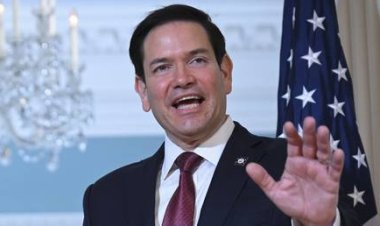Kamala Harris Gains Favor Among Michigan College Students, But the Uncommitted Movement May Jeopardize Her Election Chances.
The momentum of the campus “uncommitted” movement in Michigan has diminished. However, in a battleground state characterized by razor-thin margins, a small number of remaining supporters could make a significant impact.

The 21-year-old Michigan State University senior was an influential figure in the pro-Palestinian protests on campus. As the primary in February approaches, many activists like him refrained from voting for President Joe Biden to express their opposition to his backing of Israel, hoping to compel a shift in policy. Now, with the general election approaching and no clear policy changes visible, Estrada White finds himself confronting a dilemma common among college voters in the state: he feels hesitant to support Kamala Harris, whom he views as aligned with Israel’s actions in Gaza, but he is equally opposed to the idea of a Trump presidency.
He fears a scenario in which Trump regains power, one that could unfold like this:
Donald Trump wins Nevada, Arizona, and Georgia, securing 268 electoral votes. Kamala Harris takes Wisconsin and Pennsylvania, leaving her at 255. The election hinges on Michigan. Wayne County numbers indicate Harris performs well in Detroit, but in places like Dearborn and Dearborn Heights—areas with significant Arab American populations—Jill Stein, the Green Party candidate, garners unexpected support. Trump shows improved performance in these areas compared to 2020, particularly among more conservative Muslim voters who have shifted rightward on social issues. Additionally, young voters from the “uncommitted” movement on college campuses—those reluctant to vote for a candidate they perceive as too supportive of Israel—could tip the balance. With Trump having won Michigan by a mere 10,704 votes in 2016, this could be enough to hand him the presidency once more.
There is a plausible basis for this concern. During February’s Democratic primary, the uncommitted movement demonstrated significant influence in college towns like Ann Arbor and East Lansing, capturing 19 percent and 15 percent of the vote, respectively. Notably, that turnout occurred while students were on spring break. However, this coming November, around 75,000 undergraduates from Michigan State University (MSU) and the University of Michigan (U of M) will be present. If a substantial number of them choose to vote uncommitted or for a third party—or skip the polls altogether—it could sway the election.
Estrada White is apprehensive about this potential outcome.
“I feel this fear of a Trump presidency, and I’m committed to not letting that happen,” he expresses softly to avoid disturbing the other students in Michigan State’s main library. With Mexican heritage on his mother’s side, he experiences the anxiety and looming dread that a Trump presidency evokes.
Yet he is uncertain if he can support Harris.
“I’ll never not vote,” he asserts. “I’ll always vote down-ticket. And I don’t believe voting third party is an effective strategy here in this state. It’s a swing state; we have a lot to win and lose. … For me, my vote is — like, Harris has to do something to win it. I need to see [a] policy that says something in Israel is going to change.”
This reflects the dilemma faced by this “uncommitted” college voter in Michigan.
Estrada White isn’t alone in his sentiments. Many others on campus share similar concerns, and their decisions may significantly influence the presidential race.
It's a unique moment for a progressive 21-year-old college student in 2024. If you reflect on previous election years, it might have been John F. Kennedy who inspired you in 1960 or Barack Obama in 2008. Now, amid a political landscape dominated by Trump, your formative years have significantly shaped your expectations. The impact of the COVID pandemic disrupted traditional experiences, including potentially altering the nature of graduations. You might be entering your first presidential election considering casting a vote for “uncommitted” instead of a candidate.
“Shitty,” remarks Estrada White.
By February, he joined 101,623 Michiganders—representing 13.2 percent of the electorate—who opted for “uncommitted” in the state’s Democratic primary. This coalition of leftists, Arab Americans, Muslims, and young voters emerged partly in response to the Biden administration’s support for Israel amid its ongoing actions in Gaza, which have resulted in over 41,000 deaths.
Since February, two significant developments have created tension within the “uncommitted” coalition. The humanitarian crisis in Gaza has escalated, and Harris has become the Democratic nominee, leading to mixed reactions. While the continued violence has solidified opposition among many Arab and Muslim voters, Harris’s candidacy has sparked interest among college students eager for a younger leadership that prioritizes issues like abortion rights and democratic integrity.
While some college students express growing support for Harris, others recognize a fatigue related to the issue of Gaza. “People are burning out,” observes Estrada White. “Month after month, almost going on an entire year, we see this genocide happening. I think there’s large sections of campus—ones who aren’t having to readily interact with their family being in Gaza—who are getting desensitized to the violence.”
Saba Saed, a 22-year-old studying neuroscience who has family in Gaza, reiterates this sense of numbness among her peers. “You kind of have to be,” she remarks in a nearby coffee shop, where students are absorbed in their studies. “Should a rational person be able to conceptualize what’s happening there, day to day?”
When discussing the war and Israel’s military actions in Gaza, Saed reacts strongly to the terminology used. “Is it not concerning, slightly, how violent this past year has been? And we’re still debating whether or not it is, like … you’re using ‘assault’? ‘War’? No. Gen-o-cide.”
The term resonates even with young voters supporting Harris. “Obviously, there’s a genocide going on,” asserts Matthew Anderson, a 22-year-old political organizer who recently graduated and was promoting voter registration on campus. “But we can still do our part on women’s rights, environmental rights and stopping a would-be dictator.”
As Biden steps aside and Harris takes the lead, her ability to convey a clear message and challenge Trump may resonate with students. “A lot of the feelings around [Biden] were that, ‘We held our noses in 2020; why are we doing it again in 2024?’” explains Anne Ginzburg, a 21-year-old statistics major. “Now, under Harris, enthusiasm has definitely gone up.”
This uptick in enthusiasm may stem from Harris’s relative youth and the absence of a fixed profile, allowing students to project their aspirations onto her candidacy. Political messaging directed at students has intensified; recent ads in The State News, MSU's student-run publication, underscore potential threats such as “Trump’s Project 2025 agenda” and stress “fundamental freedoms” at stake in the election, including the “freedom to live safe from gun violence.” This concern carries weight on a campus marked by violence, such as the tragic shooting in February 2023.
Moreover, issues like abortion rights resonate with many students, particularly in light of Michigan’s 2022 ballot proposal that enshrined abortion rights in the state constitution, receiving broad support—including significant votes from MSU students. Although Trump has indicated he won’t sign a national abortion ban, the fears surrounding it, as well as issues related to access to reproductive health and contraception, are prevalent among students.
As the president of the MSU Democrats, Liam Richichi notes the increasing engagement among young voters. “People are excited to have somebody who is new blood, someone that’s … kind of passing the torch,” he comments, observing a surge in attendance at club events.
Nevertheless, the situation in Gaza continues to be a prevalent topic among students, even as Harris’s candidacy alleviates some of the earlier concerns. There are still several students unsure about fully committing to Harris, and their choices in this crucial swing state could ultimately be pivotal. Some even downplay the threat Trump poses.
“I’m not scared of him. He’s all, like, bark and barely any bite,” says Saed. While she doesn’t believe any candidate has sufficiently earned her support, she plans to vote in November.
“I just blame the Democrats if they lose to Trump; it’s not my responsibility at that point,” she expresses, aware of the implications of her non-support for Harris. “As an Arab-American, are you going to [be OK] with a Muslim ban? Is that going to be fine with you? You know what? If it comes [with] saving people from genocide.”
Saed’s first experience voting was in 2020, when she felt she had to “settle for Biden.” She’s grown weary of settling.
This sentiment is echoed by other students who feel that Harris has not adopted a markedly different stance regarding Gaza. “You really have to question whether this ‘cease-fire’ rhetoric [from the Harris campaign] is genuine,” Estrada White questions. “If we actually cared about getting a cease-fire deal, the vice president would call for an arms embargo.”
Where does this leave Estrada White regarding his ballot? Casting it for Harris or leaving it blank? He’s still contemplating. When asked if he believes it matters why someone might choose not to vote for president, he reflects on the broader implications.
“I think divorced from the reality in which they’re happening, the effect is the same. But I think … oftentimes, the act of an election campaign is saying, ‘Hey, we’re making a collective decision that we want this person or this policy in place so that things can get better for us because we believe what they’re saying.’ And so, if you’re saying, ‘I’m not going to vote because I don’t care,’ that to me is weird, because why abandon a way in which we could, if marginally, improve our lives? But if you’re saying, ‘I’m not voting because I actually don’t believe anyone on the ticket right now is going to benefit me or the people that I love and care about,’ I would say, ‘OK, that makes sense to me.’”
Ultimately, Estrada White hopes to avoid leaving his ballot blank; he wishes for a compelling reason to vote for Harris, a rationale that explains how she could be an improvement over Biden.
As of now, he hasn’t found it.
“At the end of the day,” he concludes, “I’ll decide when I get into the voting booth.”
Frederick R Cook contributed to this report for TROIB News












